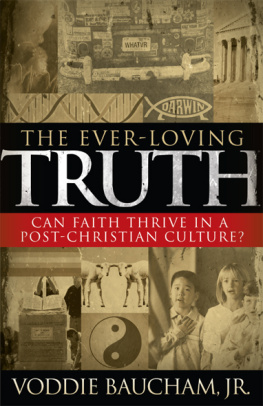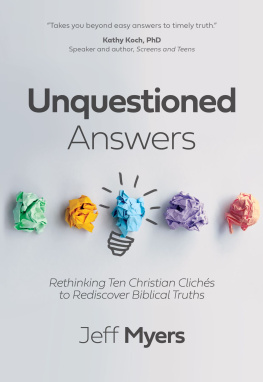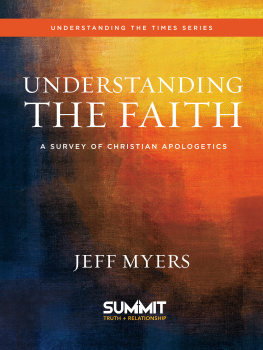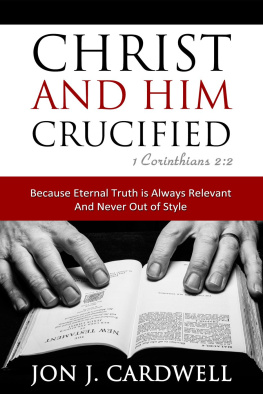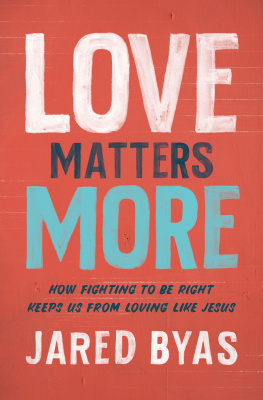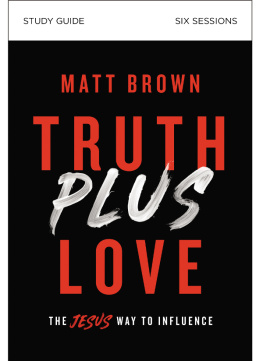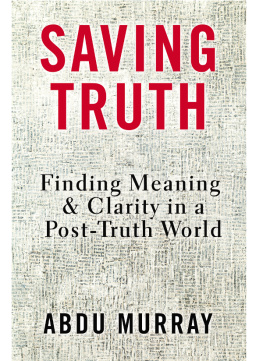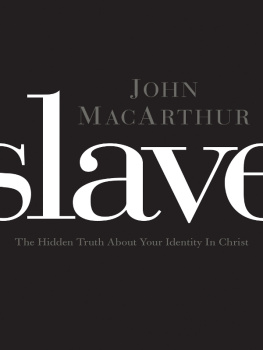
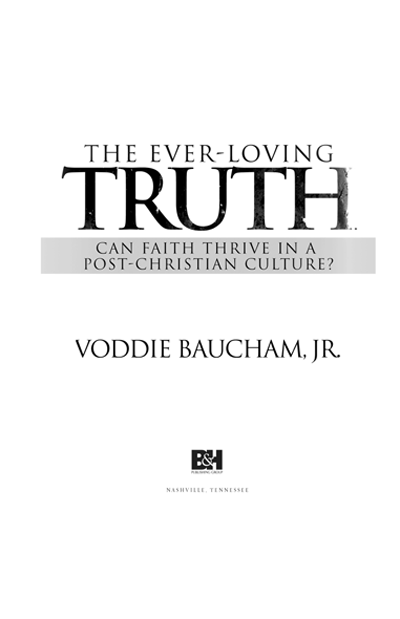
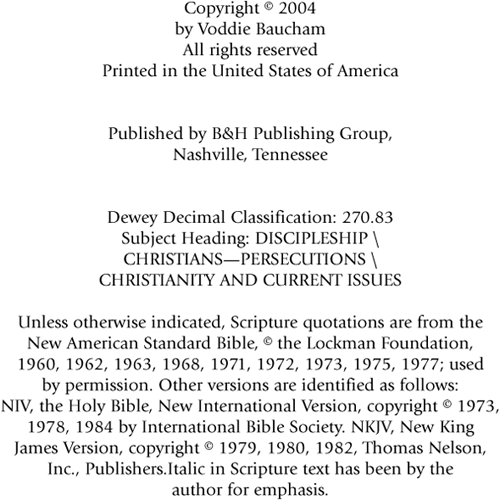
To the love of my life, Bridget
My Proverbs 31 woman,
the mother, and teacher of my children,
and my partner in preparing them
to impact the culture for the cause of Christ
CONTENTS
Pre-Christian Attitudes in a Post-Christian Culture
Drawing a Line in the Sand
What Shall We Say?
PREFACE
T ruth is under attack in our culture. The person who believes in ideas, concepts, values, or facts that are true for all people in all places for all times is rare, indeed. One is much more likely to hear the new clich, That may be true for you, but it is not necessarily true for me. Gone are the days when right and wrong were black and white. Today's morality is painted in shades of gray. Same-sex unions are a reality in Vermont; the concept of creation is not allowed to share space in the classroom with the tenuous, unsupported theory of evolution; Ten Commandments displays are under attack in the public square; the pledge of allegiance has been brought into question in California; and the Christmas holiday has become a winter break. Where will it all end? Or better yet, where did it begin?
This book is the result of what seems like a lifelong search to answer these and other questions about the way our culture has taught us to think (or not to think). Much of what has become readily accepted in the marketplace of ideas is not only unbiblical but in many instances utterly illogical. However, this is not new. Much of what we are experiencing in post-Christian America is eerily similar to what the early church experienced in pre-Christian Rome.
Peter and John were marginalized for their reliance upon unorthodox argumentation; modern Christians are accused of checking their minds at the church door or committing intellectual suicide for believing the Bible. Peter and John were forbidden to speak or teach in the name of Jesus; modern American Christians face the same injunction. The similarities are striking.
Unfortunately, however, the similarities tend to cease when it comes to the apostles' response. They challenged their culture; we tend to conform to ours. They embraced the sovereignty of God in the midst of their persecution; we question the sovereignty of God in ours. They considered it a privilege to suffer for the cause of Christ; we have been conditioned to view it as punishment. Our response to the post-Christian culture in which we live leaves quite a bit to be desired.
I had a conversation with a pastor friend not long ago. He asked me about the subject of the book he had heard I was working on. When I told him, he replied, I've got one for you. He began to tell me about an interesting Sunday night Bible study he had led a few weeks earlier. He was teaching through 1 Corinthians, and he had come to chapter 5. The young people, as was their practice, were sitting in a group down front. He was especially sensitive to their whereabouts, as he knew that the discussion of the man in the text who had been involved in an illicit affair with his stepmother would intrigue them.
Much to the pastor's surprise, it was not the idea of the illicit affair that intrigued the crowd but the idea that Paul would have the audacity to suggest to the church at Corinth that they should have removed him from their midst. That was the part of the text that the crowd found most disturbing. Many of those presentboth young and oldcould not believe that Paul said, I have already passed judgment on the one who did this. The pastor, upon sensing the discomfort in the room, asked for input from the group. He was not surprised when one of the young people said, I thought we weren't supposed to judge. He was, however, surprised when one of the older membersa leader in the churchstated, I don't care what the Bible says; we are not supposed to judge other people!
The pastor was aghast. He pressed the point. He used Scripture, logic, everything he could think of to make his point. He even went to the oft-misquoted and misunderstood passage in Matthew 7 and addressed the misconception. Nothing got through. No one was willing to say that what the man in the text had done was right. Nevertheless, no one was willing to agree with the actions of Paul.
I had a similar encounter after a message I preached from the fourteenth chapter of John. Immediately following the service, a woman came barreling toward me. She had no problem with the part of the text which taught that Jesus was preparing a place in his Father's house for those who follow him. She did, however, have, in her words, a serious problem with the idea that Jesus is the only way. She spoke in a sympathetic yet condescending tone, as though she were making me aware of what must have been a monumental oversight on my part. However, her sympathy and condescension quickly turned to outrage and disbelief when I assured her that I meant to say exactly what I said, and exactly the way I said it. She said she couldn't understand how I, of all people, could be so narrow-minded.
The key to understanding these and other such encounters is to understand the philosophical assumptions that serve as the backdrop to much of people's thinking. Many in our culture have been conditioned to sift all religious discussions through the colander of religious relativism, tolerance, and philosophical pluralism. These are the ideas that lead to statements such as, We all worship the same God, All religions are equal, and that oft-voiced question, Who are we to judge others? The beliefs behind these words have led us to consider those who have strong religious convictions as having checked their minds at the door.
I assert that nothing could be further from the truth. There is a God, and that God has revealed himself. Therefore, if we have access to that revelation, we have access to truththe kind that is true for all people, in all places, at all timestruth that is absolute. This does not give those of us who know this God a license to be arrogant, rude, or obnoxious. On the contrary, it gives us an obligation to speak the truth in love.
Section One
Pre-Christian Attitudes
in a Post-Christian
Culture
S everal years ago I had the privilege of preaching to a group of college students from across the United States. The person who had extended the invitation simply requested that I address these students where they live. He knew that I was enamored with the art and science of apologetics, so he suggested that I pick an issue and have at it.
As I anticipated the event, I began to go over past experiences and conversations with college students in my mind. Several themes emerged. One recurring theme was the conversation with the antagonistic college professor. Many students have asked me the same question over the years: What do I say to a professor who insists on demeaning my faith in class? Another theme was the attack by anti-Christian campus groups. Christian groups are often prime targets for campus organizations bent on secular-humanistic or even pagan worldviews. Yet another theme in these conversations over the years has centered on what constitutes a legal expression of religious faith. Students wanted to know if they could wear clothing with Christian themes, if they could decorate the doors of their dorm rooms for Christmas, or if they could hold Christian services on campus. In other words, Where is the mysterious line of separation between church and state?
Next page
